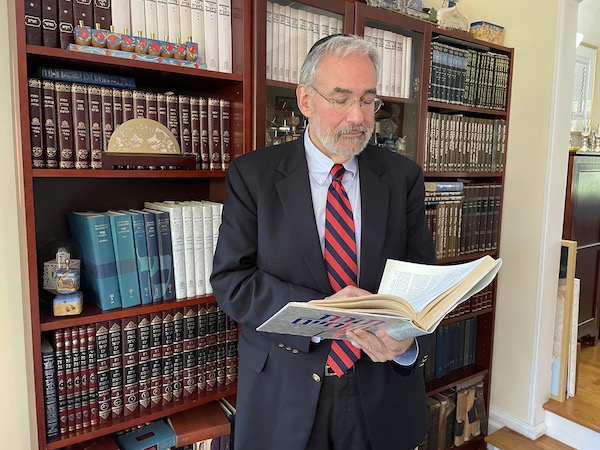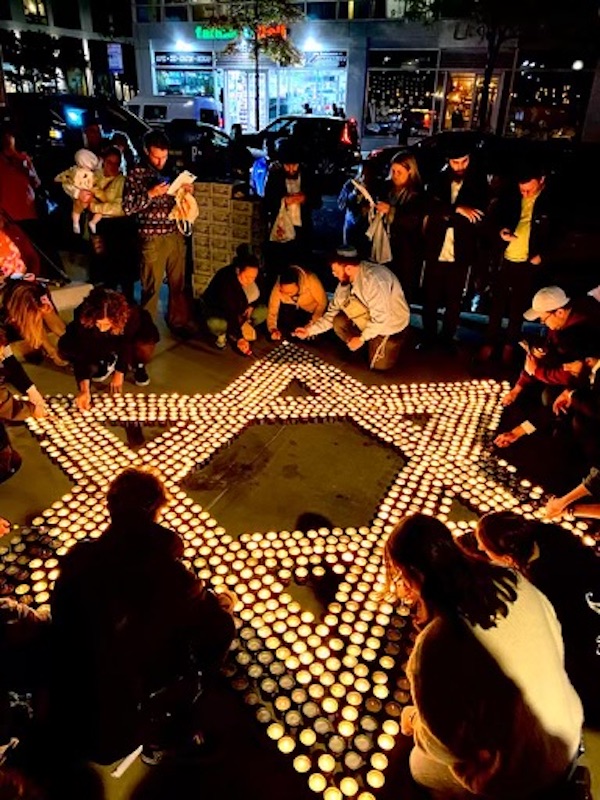
BRONX — Riverdale, the quiet, leafy neighborhood in the northern Bronx, is more than 5,000 miles away from the turmoil in Israel. But for Rabbi Brad Hirschfield, the terror attack by Hamas on Oct. 7 hit close to home.
Rabbi Hirschfield, president of the National Jewish Center for Learning and Leadership (CLAL), has relatives living in Israel, including two nephews serving in that country’s military.
Seated in his sun-filled living room in Riverdale on Oct. 13, he is reluctant to talk about his nephews out of concern for their security.
However, there is another reason for his reticence. “Nothing I tell you isn’t true of hundreds of thousands of people. There is nothing special about what I and my family are going through,” he explained. “In fact, we’re very lucky. We haven’t buried anyone close to us.”
By contrast, his heart aches for a friend in Israel who is anxiously awaiting word on the fate of his son, an Israeli soldier believed to have been kidnapped by Hamas on the day of the attack.
Calling this a time of “almost unspeakable pain and loss” for the Jewish people, Rabbi Hirschfield noted that the attack by Hamas marked the 24 hours in which the greatest number of Jews — 1,300 — were murdered in one day since the end of the Holocaust.
“At the same time, it’s been a time of remarkable nurturing of hope and the affirmation of life,” he said, referring to relief efforts underway both in Israel and the U.S. to collect emergency supplies like First Aid kits, hygiene products, and other items to send to the servicemembers.
Rabbi Hirschfield has turned his garage into a mobilization center, where donated supplies are delivered, packaged in boxes, and then shipped to Israel. “I think most decent people in these kinds of moments are all asking the same question: ‘What positive difference can I make in the midst of so much pain?’ The key is learning how to answer that question in a way that’s more productive and more helpful,” he explained.
On this day, the garage was nearly empty. The previous shipment had gone out. But it will likely fill up again. Rabbi Hirschfield had relatives ask one of his nephews what his military unit needed. “I said, ‘Maybe, we should just check in and see if his soldiers in particular need anything.’ And he responded saying, ‘Thermals will be really good.’ So we will pull some of those that have arrived out of the collection and send them directly to him,” he explained.
Local reaction to the attack by Hamas has been one of shock, anger, and a determination to come together in prayer.
On Oct. 12, Chabad of Clinton and Pratt, located in Clinton Hill, organized a prayer vigil during which 1,300 candles were lit in a Star of David pattern to commemorate the 1,300 people killed in the attack.

Robin Joseph, who attended the vigil, said Jews are united in their grief and determination. “We were always taught that when something happens to one of us, it happens to all of us,” she told Currents News. “And it’s up to us to stand up and remember everyone who has been lost and pray for everyone who’s in the thick of it right now.”
Rabbi Yossi Eliav, director of Chabad of Clinton and Pratt, said he felt physically sickened by the terror attack. “My stomach turned upside down. It’s amazing how much emotional shock can really affect physical strength and energy,” he said. “I had to pull myself together because of my position. As a rabbi. It’s my responsibility to strengthen those in the community.”
The purpose of the vigil was to pay tribute to the victims but to also encourage members of the Jewish community, according to Rabbi Eliav, who said he had heard reports of college students expressing reluctance to go to class, walk the streets, and live their lives.
“Our goal is to try to uplift their spirits and show them that they can come out and that there’s support and that they should be proud of who they are,” he explained.
Fear is also prevalent in the Muslim community, said Edward Ahmed Mitchell, deputy executive director of the Council on American-Islamic Relations (CAIR).
He urged people to avoid lumping all Palestinians with Hamas. “We in the Islamic community expressed our sorrow and our horror at the attack against Israel. But we’ve seen people this week justifying the killing of Palestinian civilians and we’ve heard language dehumanizing Palestinians, calling them animals and baby killers,” he said.
Mitchell spoke to the Tablet on Oct. 16, two days after the murder of Wadea Al-Fayoume, a 6-year-old Palestinian boy stabbed to death in a Chicago suburb in an attack under investigation as a hate crime. The little boy’s family’s landlord was arrested and charged with murder.
Police said the boy’s mother was also stabbed and that the victims were targeted by the suspect, Joseph Czuba, 71, because of his anger over the Israel-Hamas conflict.
“We are angered and disturbed by the murder of this young innocent boy in Chicago. But we’re not surprised,” Mitchell said. “This past week has taken us back in time to a point in our country when Islamophobia was out of control.”
Rabbi Hirschfield will be traveling to Israel with a delegation of Jewish leaders from around the U.S. He is very familiar with the nation.
He is uncertain as to what he and the delegation will find or what the future holds. “I feel like we’re entering a long dark tunnel. I don’t know what comes out the other end,” he said.
